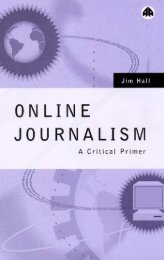Modul Mata Kuliah Journalisme Online - Ayo Menulis FISIP UAJY
Modul Mata Kuliah Journalisme Online - Ayo Menulis FISIP UAJY
Modul Mata Kuliah Journalisme Online - Ayo Menulis FISIP UAJY
You also want an ePaper? Increase the reach of your titles
YUMPU automatically turns print PDFs into web optimized ePapers that Google loves.
of civil discourse and debate. News organizations should create terms of service for users contributing<br />
content to the news organization's digital editions. Such terms cover such issues as the use of obscenity,<br />
personal attacks, etc. in material published by non-staffers. Publishers should also be clear about the<br />
consequences for violating terms of service, e.g. immediate banning from further posting, suspension,<br />
etc.<br />
How do you decide when the editorial significance of an event overrides the limited quality of the<br />
video or audio?<br />
Journalists should be guided by three main principles: telling the story as fully and truthfully as possible,<br />
acting as independently as possible, and causing as little harm as possible. Low production quality -whether<br />
video or audio or something else -- diminishes the credibility of the material presented.<br />
Journalists need to weigh that consideration against the importance and interest level of the event<br />
that's being reported. The greater the importance and interest level, the greater allowance for limited<br />
quality production values.<br />
(This section composed by: Sharon Rosenhause, Rich Murphy, Neil Budde, Steve Yelvington, Vanessa<br />
Goodrum and Bill Mitchell.)<br />
Workplace Issues: Speed, Thoroughness & Capacity<br />
There is an inherent tension between the value of speed in the online world and journalism's obligation<br />
for thorough, accurate, ethical work.<br />
A set of standards that creates a conscious, deliberate process helps balance these sometimes<br />
conflicting values. In addition, leadership needs to be committed to applying tools, time and training to<br />
meet these standards. This is especially important in a new medium.<br />
We know that the online universe offers endless opportunities for innovation, timeliness and freedom.<br />
These standards are intended to improve the work of journalists as they explore the medium's potential.<br />
Issues<br />
We're in an environment with exponentially expanding material (including user-generated<br />
content) and limited resources; can we vet everything that appears online?<br />
Job functions are changing, requiring different skill sets and attitudes.<br />
The online environment requires news be produced quickly as possible.<br />
Institutions may not value online platforms as much as they should.<br />
Notifying users of changes and corrections is difficult.<br />
Editors and staffers no longer have total control of the online product, by design.<br />
The process for publishing material online is often ad hoc, without deliberation.<br />
<strong>Online</strong> platforms are often detached from the legacy products which give them their<br />
imprimatur.<br />
Linking to outside material is a strength of the Web, but also raises a host of ethical issues.<br />
Principles & Values
















